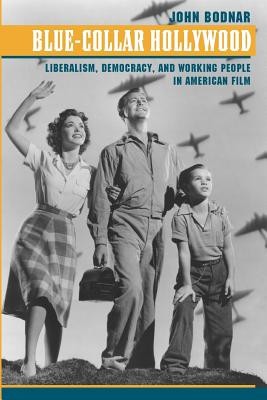
- We will send in 10–14 business days.
- Author: John Bodnar
- Publisher: Johns Hopkins University Press
- ISBN-10: 080188537X
- ISBN-13: 9780801885372
- Format: 15.2 x 22.9 x 1.9 cm, minkšti viršeliai
- Language: English
- SAVE -10% with code: EXTRA
Reviews
Description
Selected by Choice Magazine as an Outstanding Academic Title for 2003
From Tom Joad to Norma Rae to Spike Lee's Mookie in Do the Right Thing, Hollywood has regularly dramatized the lives and struggles of working people in America. Ranging from idealistic to hopeless, from sympathetic to condescending, these portrayals confronted audiences with the vital economic, social, and political issues of their times while providing a diversion--sometimes entertaining, sometimes provocative--from the realities of their own lives.
In Blue-Collar Hollywood, John Bodnar examines the ways in which popular American films made between the 1930s and the 1980s depicted working-class characters, comparing these cinematic representations with the aspirations of ordinary Americans and the promises made to them by the country's political elites. Based on close and imaginative viewings of dozens of films from every genre--among them Public Enemy, Black Fury, Baby Face, The Grapes of Wrath, It's a Wonderful Life, I Married a Communist, A Streetcar Named Desire, Peyton Place, Taxi Driver, Raging Bull, Coal Miner's Daughter, and Boyz N the Hood--this book explores such topics as the role of censorship, attitudes toward labor unions and worker militancy, racism, the place of women in the workforce and society, communism and the Hollywood blacklist, and faith in liberal democracy.
Whether made during the Great Depression, World War II, the Cold War, or the Vietnam era, the majority of films about ordinary working Americans, Bodnar finds, avoided endorsing specific political programs, radical economic reform, or overtly reactionary positions. Instead, these movies were infused with the same current of liberalism and popular notion of democracy that flow through the American imagination.
EXTRA 10 % discount with code: EXTRA
The promotion ends in 21d.15:55:01
The discount code is valid when purchasing from 10 €. Discounts do not stack.
- Author: John Bodnar
- Publisher: Johns Hopkins University Press
- ISBN-10: 080188537X
- ISBN-13: 9780801885372
- Format: 15.2 x 22.9 x 1.9 cm, minkšti viršeliai
- Language: English English
Selected by Choice Magazine as an Outstanding Academic Title for 2003
From Tom Joad to Norma Rae to Spike Lee's Mookie in Do the Right Thing, Hollywood has regularly dramatized the lives and struggles of working people in America. Ranging from idealistic to hopeless, from sympathetic to condescending, these portrayals confronted audiences with the vital economic, social, and political issues of their times while providing a diversion--sometimes entertaining, sometimes provocative--from the realities of their own lives.
In Blue-Collar Hollywood, John Bodnar examines the ways in which popular American films made between the 1930s and the 1980s depicted working-class characters, comparing these cinematic representations with the aspirations of ordinary Americans and the promises made to them by the country's political elites. Based on close and imaginative viewings of dozens of films from every genre--among them Public Enemy, Black Fury, Baby Face, The Grapes of Wrath, It's a Wonderful Life, I Married a Communist, A Streetcar Named Desire, Peyton Place, Taxi Driver, Raging Bull, Coal Miner's Daughter, and Boyz N the Hood--this book explores such topics as the role of censorship, attitudes toward labor unions and worker militancy, racism, the place of women in the workforce and society, communism and the Hollywood blacklist, and faith in liberal democracy.
Whether made during the Great Depression, World War II, the Cold War, or the Vietnam era, the majority of films about ordinary working Americans, Bodnar finds, avoided endorsing specific political programs, radical economic reform, or overtly reactionary positions. Instead, these movies were infused with the same current of liberalism and popular notion of democracy that flow through the American imagination.


Reviews